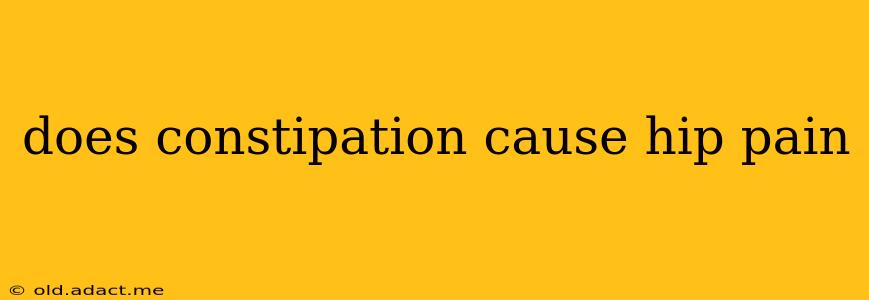Does Constipation Cause Hip Pain? Unpacking the Connection
Constipation, characterized by infrequent or difficult bowel movements, can indeed contribute to hip pain, although it's not a direct cause in most cases. The relationship is often indirect, stemming from the strain and pressure placed on the pelvic floor and surrounding muscles. Understanding this connection is crucial for effective pain management.
How Constipation Can Lead to Hip Pain
The primary way constipation triggers hip pain is through increased intra-abdominal pressure. When you strain during bowel movements, you're significantly increasing the pressure within your abdomen. This pressure can:
- Affect the sacroiliac (SI) joints: These joints connect your sacrum (the triangular bone at the base of your spine) to your pelvis. Increased pressure can irritate these joints, leading to pain radiating to the hips and lower back.
- Strain the pelvic floor muscles: Chronic constipation can lead to prolonged straining, weakening and tightening the pelvic floor muscles. This can create muscle imbalances, referred pain, and trigger points that manifest as hip pain.
- Put pressure on nerves: A full colon can compress nerves in the pelvic region. This nerve compression can cause radiating pain to the hips, buttocks, and even legs.
- Contribute to poor posture: The discomfort associated with constipation can cause you to adopt compensatory postures to relieve pressure, potentially leading to muscle strain and pain in the hips and elsewhere.
What are the symptoms of constipation related hip pain?
The pain associated with constipation-related hip pain often presents as:
- A dull ache or throbbing in the hip area.
- Pain that worsens after bowel movements.
- Pain that is relieved after a bowel movement.
- Pain that is worse with prolonged sitting or standing.
- Pain that is accompanied by other symptoms of constipation, such as abdominal bloating, discomfort and infrequent bowel movements.
It's important to note that the hip pain might not be directly in the hip joint itself, but rather in the muscles and tissues surrounding it.
Can other conditions cause similar hip pain?
Many other conditions can cause hip pain, making it crucial to rule out other possibilities. These include:
- Osteoarthritis: Degenerative joint disease causing cartilage breakdown.
- Bursitis: Inflammation of the fluid-filled sacs cushioning the hip joint.
- Tendinitis: Inflammation of the tendons surrounding the hip joint.
- Muscle strains or tears: Injuries to the muscles in the hip and surrounding areas.
- Sciatica: Nerve pain radiating from the lower back down the leg, often including the hip.
Therefore, attributing hip pain solely to constipation is incorrect without a thorough medical evaluation.
How is constipation-related hip pain diagnosed?
Diagnosing constipation-related hip pain involves a comprehensive assessment by a healthcare professional. This typically includes:
- A detailed medical history: Reviewing your bowel habits, pain symptoms, and other relevant information.
- Physical examination: Assessing your posture, range of motion, and palpating for muscle tenderness.
- Imaging studies (if necessary): X-rays, MRI, or CT scans might be ordered to rule out other conditions.
How is constipation-related hip pain treated?
Treatment focuses on addressing both the constipation and the resulting hip pain. This usually involves:
- Dietary changes: Increasing fiber intake, drinking plenty of fluids, and consuming foods that promote regular bowel movements.
- Lifestyle modifications: Regular exercise, stress management techniques, and maintaining a healthy weight.
- Laxatives (if necessary): Used to relieve constipation under a doctor's guidance.
- Pain management: Over-the-counter pain relievers, physical therapy, and other modalities might be recommended.
- Manual therapy: Techniques to alleviate muscle tension and improve pelvic floor function.
Disclaimer: This information is for educational purposes only and is not a substitute for professional medical advice. If you're experiencing hip pain, consult a healthcare professional for an accurate diagnosis and personalized treatment plan. They can differentiate between constipation-related hip pain and other potential causes.
